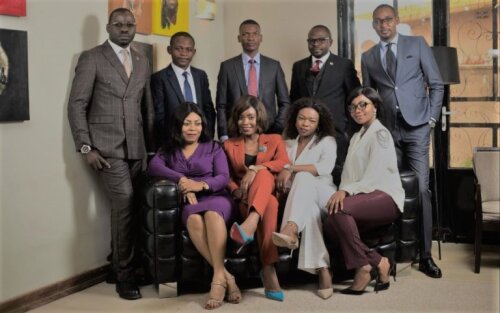Best Energy, Environment & ESG Lawyers in Lubumbashi
Share your needs with us, get contacted by law firms.
Free. Takes 2 min.
List of the best lawyers in Lubumbashi, DR Congo
About Energy, Environment & ESG Law in Lubumbashi, DR Congo
Lubumbashi is the second largest city in the Democratic Republic of Congo (DR Congo) and a major hub for mining and industrial activity. The region is rich in minerals-particularly copper and cobalt-making the sectors of energy, environment, and Environmental, Social and Governance (ESG) crucial. Energy, Environment & ESG law in Lubumbashi refers to the set of legal frameworks, regulations, and guidelines that govern activities related to energy production and consumption, environmental protection, and the ethical operation of businesses according to global ESG standards. These laws are designed to strike a balance between economic development and the preservation of the region’s natural resources, public health, and societal welfare.
Why You May Need a Lawyer
Navigating energy, environmental, and ESG regulations in Lubumbashi can be complex. Residents, business owners, investors, or organizations often seek legal counsel for various reasons, including:
- Starting a new mining or industrial project and needing permits or licenses
- Ensuring compliance with local and international environmental standards
- Dealing with environmental damage or pollution claims
- Negotiating power purchase agreements or energy supply contracts
- Handling disputes with government regulators or local communities
- Implementing ESG strategies to attract foreign investment or access financing
- Understanding changes in laws affecting renewable energy or waste management
- Responding to investigations or enforcement actions by environmental agencies
Legal professionals specializing in these areas help clients understand their obligations, make informed decisions, and resolve disputes efficiently.
Local Laws Overview
Key regulations that are particularly relevant to Energy, Environment & ESG in Lubumbashi include:
- Mining Code and Regulations: DR Congo’s Mining Code (as amended in 2018) requires companies to secure permits, conduct environmental and social impact assessments, and implement mitigation measures.
- Environmental Protection Laws: Environmental legislation mandates the protection of ecosystems, prevention of pollution, waste management, and remediation of environmental harm.
- Energy Laws: These cover the generation, distribution, and sale of electricity, with an emphasis on private participation and the development of renewable energy sources.
- ESG Reporting: More businesses are expected to disclose their ESG practices, including labor rights, community engagement, and anti-corruption measures, to meet international investor standards.
- Land Use and Water Rights: Regulations govern land acquisition, use of water resources, and rehabilitation of used land, particularly for mining and agriculture.
Government authorities such as the Ministry of Environment and Sustainable Development, the Ministry of Mines, and the National Agency for the Promotion of Renewable Energy play key roles in enforcement and oversight.
Frequently Asked Questions
What permits are required for a mining or energy project in Lubumbashi?
Depending on the project type, you may need an exploration or exploitation license from the Ministry of Mines, as well as environmental permits following an environmental impact assessment.
How does the government regulate environmental protection in mining activities?
The law requires mining companies to take measures to prevent environmental degradation, rehabilitate mining sites, and provide compensation for any harm caused. Regular inspections and reporting are mandatory.
What is ESG, and why is it important in Lubumbashi?
ESG stands for Environmental, Social, and Governance. It is a set of standards for business operations. In Lubumbashi, adherence to ESG standards is vital to attract investment, maintain compliance with laws, and improve community relations.
Can foreign investors own renewable energy projects in Lubumbashi?
Yes, foreign investors are allowed to own and operate renewable energy projects, subject to licensing requirements and regulations.
Are there special environmental rules for artisanal mining?
Artisanal miners are also subject to environmental regulations, though often with less stringent requirements than industrial operators. Registration and adherence to safety and environmental standards remain mandatory.
What happens if someone violates environmental regulations?
Violations can result in administrative penalties, fines, suspension or revocation of licenses, and in severe cases, criminal prosecution.
How can a company improve its ESG rating?
By implementing policies for environmental protection, respecting labor and human rights, ensuring transparency, and engaging with local communities, a company can enhance its ESG profile.
Who oversees the enforcement of energy and environmental laws?
The Ministry of Environment and Sustainable Development and the Ministry of Mines are the main enforcement bodies. They work with local agencies and sometimes with relevant international organizations.
Do businesses have to report environmental or ESG information?
Many businesses, especially larger ones, are required to report on environmental performance, social responsibility, and governance practices, especially when seeking financing from international banks or investors.
How can communities address environmental harm from mining or energy projects?
Communities can file complaints with government agencies, seek mediation, or pursue legal actions with the help of an attorney specializing in environmental law.
Additional Resources
Several organizations and governmental bodies can provide information and assistance regarding Energy, Environment & ESG matters in Lubumbashi:
- Ministry of Environment and Sustainable Development
- Ministry of Mines
- National Agency for the Promotion of Renewable Energy
- Congolese Bar Association (Ordre des Avocats)
- Local NGOs focusing on environmental protection or community advocacy
- International organizations such as the United Nations Environmental Programme or World Bank local offices
Next Steps
If you need legal assistance in the field of Energy, Environment & ESG in Lubumbashi, consider these steps:
- Clarify your legal issue-whether it is obtaining a permit, responding to a regulatory notice, or seeking advice on ESG compliance.
- Gather any relevant documents, including licenses, contracts, official correspondence, and environmental reports.
- Consult with a qualified lawyer who specializes in Energy, Environmental, or ESG law. The Congolese Bar Association can provide a list of practitioners.
- Seek guidance from relevant government agencies if questions pertain to specific regulations or permits.
- If you are part of a community or organization, consider pooling resources to access legal expertise or mediation services.
- Stay updated on relevant regulatory changes or new requirements that may affect your project or business.
Taking prompt action and working with a knowledgeable legal advisor can help you address challenges effectively and ensure compliance with Lubumbashi’s energy, environment, and ESG legal requirements.
Lawzana helps you find the best lawyers and law firms in Lubumbashi through a curated and pre-screened list of qualified legal professionals. Our platform offers rankings and detailed profiles of attorneys and law firms, allowing you to compare based on practice areas, including Energy, Environment & ESG, experience, and client feedback.
Each profile includes a description of the firm's areas of practice, client reviews, team members and partners, year of establishment, spoken languages, office locations, contact information, social media presence, and any published articles or resources. Most firms on our platform speak English and are experienced in both local and international legal matters.
Get a quote from top-rated law firms in Lubumbashi, DR Congo — quickly, securely, and without unnecessary hassle.
Disclaimer:
The information provided on this page is for general informational purposes only and does not constitute legal advice. While we strive to ensure the accuracy and relevance of the content, legal information may change over time, and interpretations of the law can vary. You should always consult with a qualified legal professional for advice specific to your situation.
We disclaim all liability for actions taken or not taken based on the content of this page. If you believe any information is incorrect or outdated, please contact us, and we will review and update it where appropriate.
Browse energy, environment & esg law firms by service in Lubumbashi, DR Congo
Lubumbashi, DR Congo Attorneys in related practice areas.











